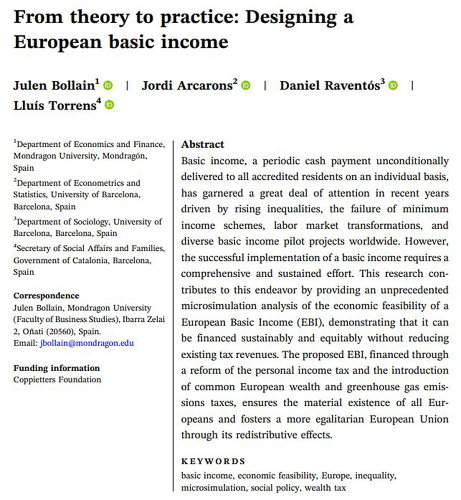
by Peter Knight | Mar 19, 2025 | News
Dr. Malcolm Torry, a British academic, has been a leading researcher on basic income for more than 40 years. As Director of the Citizen’s Basic Income Trust (CBIT) from 2001 to 2020, and General Manager and then Treasurer of the Basic Income Earth Network (BIEN) from 2016 to 2024, he played a key role in policy discussions and economic research. In this interview, he discusses basic income’s history, feasibility, and societal impact, addressing its effects on employment, automation, welfare policy, and human dignity. He argues that basic income does not disincentivize work, can be a stabilizing force, and requires proper pilot projects in developed economies to measure its full effects.
Scott Douglas Jacobsen: Today, we are with Malcolm Torry, a British academic and researcher who specializes in basic income and the management of religious organizations. He holds multiple advanced degrees in psychology, economics, and social policy, though we do not necessarily need to list them all. If it runs through the journal, it gets fact-checked—the journal is live.
Dr. Torry served as Director of the Citizen’s Basic Income Trust (CBIT) from 2001 to 2020, where he played a crucial role in developing and promoting basic income research. His extensive work includes publications such as Basic Income: A History and Citizen’s Basic Income: A Multidisciplinary Approach. His research has significantly contributed to welfare policy discussions and religious institution management, influencing academic circles and public policy debates. He has recently had an interest in Continental Philosophy.
So, thank you very much for joining me today. I appreciate you taking the time out of your day for a little Canadian me. Now, in 1985, basic income came into your world. How? Why?
To read the full article, click here.

by Julen Bollain | Dec 17, 2024 | Research
A pioneering study has been published, providing the first comprehensive analysis of the financial feasibility of a European Basic Income (EBI). The research demonstrates that guaranteeing the right to existence for everyone in the European Union (EU) is not only economically viable but also promotes a more equitable and cohesive Europe.
Basic income—an unconditional, periodic cash payment to all individuals—has gained significant attention as a potential tool to address rising inequality, poverty, and labour market transformations. Despite increasing interest, no study until now has examined the financing of an EBI at the scale needed to ensure the material existence of all EU residents.
Key findings of the study:
- Eradication of poverty: The proposed EBI would eliminate poverty across the EU.
- Redistribution of wealth: The Gini index, a measure of inequality, would improve significantly from 0.3756 (pre-EBI) to 0.3000 (post-EBI).
- Benefit for the many: 63.2% of European households would see an improvement in their economic position, with the impact concentrated among the most vulnerable.
- Affordable cost: The total cost of the EBI is estimated at just 2.71% of the GDP of the EU-26.
The EBI would be financed through a combination of tax reforms, including adjustments to income tax, the introduction of a European wealth tax, and a greenhouse gas emissions tax. Crucially, the study demonstrates that these measures can fund the EBI sustainably without reducing existing tax revenues.
This research marks a critical step in proving that a European Basic Income is not only a utopian ideal but a realistic policy solution to create a fairer, more inclusive society. By addressing economic disparities and ensuring material security for all, a EBI could strengthen social cohesion and advance the European project.
The study also emphasizes that the redistribution achieved through the EBI would benefit the majority of the population while limiting losses to the wealthiest deciles, ensuring equity and fairness in its implementation.
About the study
The research was conducted by Julen Bollain, Jordi Arcarons, Daniel Raventós and Lluís Torrens and published in Poverty and Public Policy. It utilises a robust microsimulation model to analyse the financial and social impacts of the EBI, drawing on data from across the EU-26.
To read the full study, click here:
Correspondence: Julen Bollain, Mondragon University (Faculty of Business Studies), Ibarra Zelaia 2, Oñati (20560), Span. To send Julen an email, click here

by Peter Knight | Jan 25, 2024 | News
A new study prepared by Maine Center for Economic Policy on behalf of the Committee to Study the Feasibility of Basic Income Security is now available. To access the study, click here.

by Malcolm Torry | Jun 11, 2020 | News
The group studying the desirability and feasibility of a Basic Income pilot project in Scotland has published its final report.
“PARTNERS involved in exploring the feasibility of a Citizens’ Basic Income (CBI) pilot in Scotland have completed the draft final report on their findings. The report concludes a CBI pilot is desirable, but recognises the significant challenges involved. … “
To read the report, click here.
An article from the BBC about the feasibility study can be found here.
Further analysis of the report will follow soon from BIEN’s affiliate, Citizen’s Basic Income Scotland.

by Andre Coelho | Oct 9, 2019 | News
The Estonian Parliament (Riigikogu)
As reported before, an Estonian collective of basic income activists, led by Jaanus Nurmoja, delivered a petition to the Social Affairs Committee (SAC) of the Estonian Parliament (Riigikogu), calling for the investigation of a universal basic income (UBI) implementation in Estonia, on March 29th 2019. Five months later – three months passed from the excepted date of reply – the SAC decides not to study the issue, although that apparently contradicts the initiative expressed text, and Estonian Law. In the words of SAC’s spokesman (Tõnis Mölder), pronounced at the committee meeting on Tuesday, 17th of September 2019: “At the moment, however, the implementation of such a system in Estonia does not seem reasonable, as there is no financial analysis and no assurance that the current social system could be replaced by something more efficient”.
According to the activists, this decision is not consistent with Estonian Law, since the Working Rules Act is not being observed. Abiding to these rules would imply only rejecting proposals submitted “less than two years earlier or obviously [violating] constitutional principles of Estonia and international agreements”. Also, these argue that the rejection is based on a self-referring (circular) argumentation: that the proposal of investigating UBI in Estonia cannot be accepted, because there has not been any investigation on UBI in Estonia. This led the activists to question if the proposal text had even been read in full by the SAC members.
Jannus Nurmonia and the other co-signatories of the “Investigating the Feasibility and Impact of Unconditional Basic Income (Civic Salary) in Estonia” petition are now calling for a withdrawal of this decision, postponing the actual discussion of the proposal for the next SAC meeting. They are convinced a UBI will eventually be unavoidable in Estonia, and so starting feasibility studies over it should start as soon as possible.
More information at:
“Committee: Universal basic income will not be introduced anytime soon”, ERR, September 18th 2019
“Public letter: the reason for rejecting a research initiative doesn’t correspond to the initiative’s content and laws, neither”, Kodanikupalga Teataja, October 2nd 2019
André Coelho, “Estonia: Estonian Parliament examines possibility of testing basic income in the country”, Basic Income News, June 28th 2019






